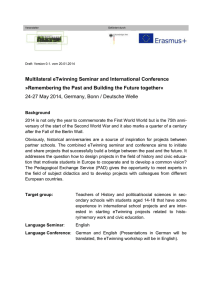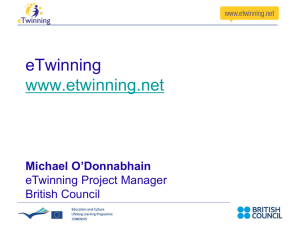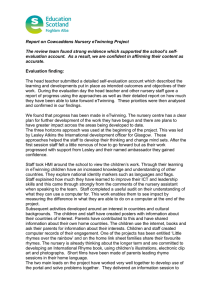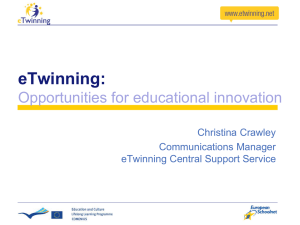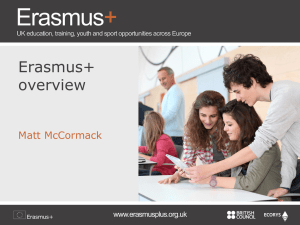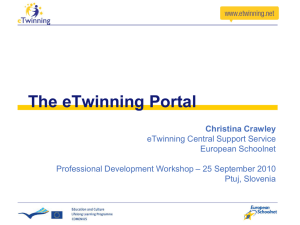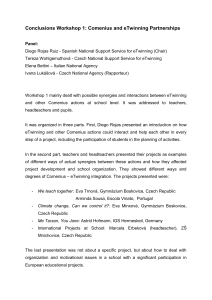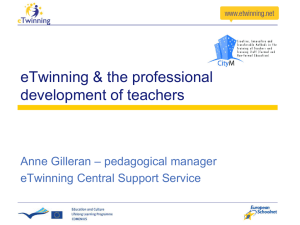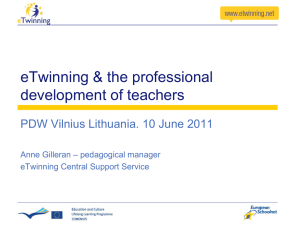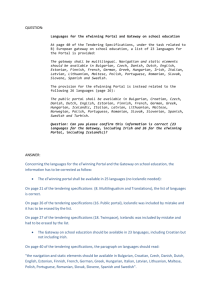DOC - Europa
advertisement
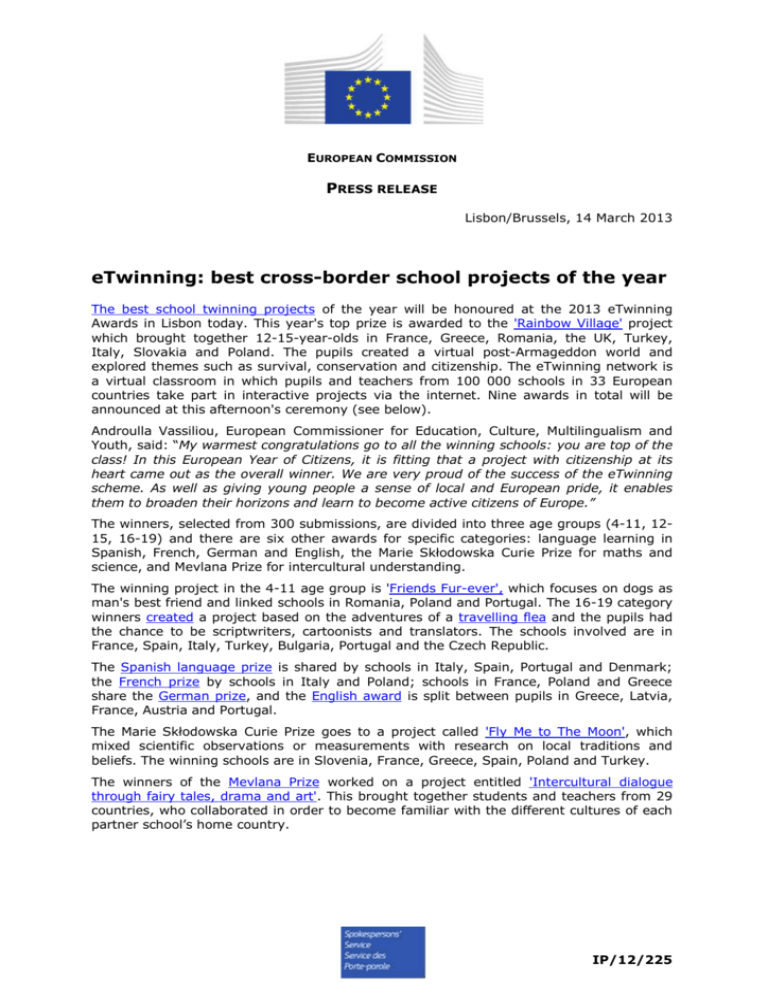
EUROPEAN COMMISSION PRESS RELEASE Lisbon/Brussels, 14 March 2013 eTwinning: best cross-border school projects of the year The best school twinning projects of the year will be honoured at the 2013 eTwinning Awards in Lisbon today. This year's top prize is awarded to the 'Rainbow Village' project which brought together 12-15-year-olds in France, Greece, Romania, the UK, Turkey, Italy, Slovakia and Poland. The pupils created a virtual post-Armageddon world and explored themes such as survival, conservation and citizenship. The eTwinning network is a virtual classroom in which pupils and teachers from 100 000 schools in 33 European countries take part in interactive projects via the internet. Nine awards in total will be announced at this afternoon's ceremony (see below). Androulla Vassiliou, European Commissioner for Education, Culture, Multilingualism and Youth, said: “My warmest congratulations go to all the winning schools: you are top of the class! In this European Year of Citizens, it is fitting that a project with citizenship at its heart came out as the overall winner. We are very proud of the success of the eTwinning scheme. As well as giving young people a sense of local and European pride, it enables them to broaden their horizons and learn to become active citizens of Europe.” The winners, selected from 300 submissions, are divided into three age groups (4-11, 1215, 16-19) and there are six other awards for specific categories: language learning in Spanish, French, German and English, the Marie Skłodowska Curie Prize for maths and science, and Mevlana Prize for intercultural understanding. The winning project in the 4-11 age group is 'Friends Fur-ever', which focuses on dogs as man's best friend and linked schools in Romania, Poland and Portugal. The 16-19 category winners created a project based on the adventures of a travelling flea and the pupils had the chance to be scriptwriters, cartoonists and translators. The schools involved are in France, Spain, Italy, Turkey, Bulgaria, Portugal and the Czech Republic. The Spanish language prize is shared by schools in Italy, Spain, Portugal and Denmark; the French prize by schools in Italy and Poland; schools in France, Poland and Greece share the German prize, and the English award is split between pupils in Greece, Latvia, France, Austria and Portugal. The Marie Skłodowska Curie Prize goes to a project called 'Fly Me to The Moon', which mixed scientific observations or measurements with research on local traditions and beliefs. The winning schools are in Slovenia, France, Greece, Spain, Poland and Turkey. The winners of the Mevlana Prize worked on a project entitled 'Intercultural dialogue through fairy tales, drama and art'. This brought together students and teachers from 29 countries, who collaborated in order to become familiar with the different cultures of each partner school’s home country. IP/12/225 Background The award ceremony in Lisbon will take place during a conference which brings together 500 teachers from 33 European countries. They will be sharing ideas and new ways of teaching, by making the most of ICT, for instance. The eTwinning scheme is part of the EU's Comenius programme and receives around €10 million in funding each year. It does not finance individual projects but offers tools and support to teachers and pupils such as the eTwinning portal and seminars for teachers. National Support Services in all EU countries, as well as Croatia, Iceland, Norway, Turkey, Switzerland and the Former Yugoslav Republic of Macedonia, promote eTwinning, provide training and offer support online and by phone. A recent study found eTwinning to be an easy and cost-effective way for schools to engage in international cooperation. It also found that teachers involved in eTwinning improved their skills, their relations with pupils and developed their professional networks. Pupils felt more motivated and were better at working in a team. As part of the new Erasmus for All programme which will start in 2014, the Commission has proposed to develop eTwinning as a platform for all schools that wish to co-operate across borders with EU support. The eTwinning scheme contributes to the EU's objectives of improving digital competence and collaborative peer learning. Later this year the Commission will publish a strategy on Opening-up Education in order to enhance education and skills development through new technologies and open educational resources. Earlier this month, the Commission launched 'eTwinning Plus', which extends the network to schools in Armenia, Azerbaijan, Georgia, Moldova and Ukraine. The Commission also plans to gradually roll out the scheme to Southern neighbourhood countries, starting with Tunisia (IP/13/183). For more information eTwinning Conference website European Commission: Comenius programme European Commission: Erasmus for All (2014-2020) Androulla Vassiliou's website Follow Androulla Vassiliou on Twitter @VassiliouEU Contacts : Dennis Abbott (+32 2 295 92 58); Twitter: @DennisAbbott Dina Avraam (+32 2 295 96 67) 2

